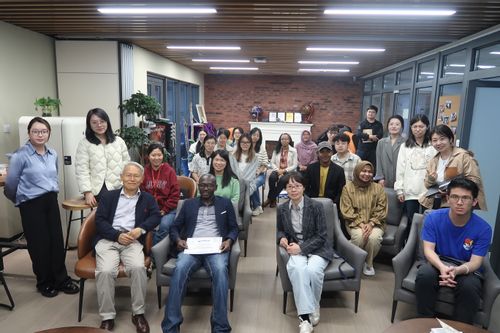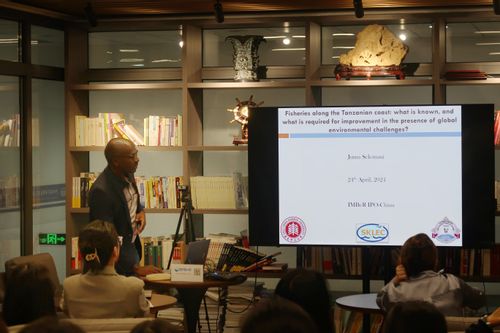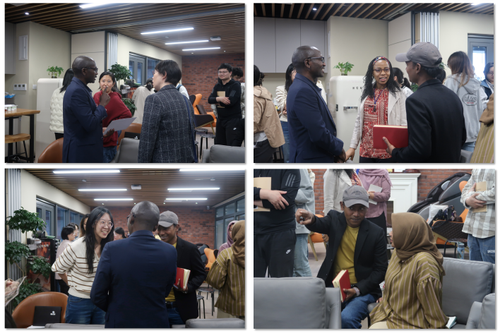促进蓝色经济:与Juma Rajabu Selemani博士一起,创新共话坦桑尼亚渔业
2024年4月24日,IMBeR国际项目办公室能力发展系列活动IMBeR Coffee Reception聚集学生、早期职业研究人员和专家,就全球环境问题下坦桑尼亚渔业所面临的挑战与机遇展开讨论。此次活动特邀尼尔森曼德拉非洲科技研究所的高级讲师、华东师范大学环境科学专业校友 (2013-2018) Juma Rajabu Selemani博士带来精彩报告。

Selemani博士讲述了“坦桑尼亚沿海渔业:在全球环境挑战面前,我们知道什么?有何改善措施?”,说明了坦桑尼亚渔业的潜力尚未被充分开发,并强调了渔业在促进国民经济和营养以实现坦桑尼亚可持续发展目标的关键作用。通过描述坦桑尼亚渔业的现状,他指出小型个体活动在浅水区域占据主导地位,商业产业的参与度较低。

>>>观看报告录像 Watch the recording<<<
坦桑尼亚重视蓝色经济在促进经济、改善民生以及保护海洋生态系统方面的潜在作用。为进一步发展,Juma详细介绍了渔业行业面临的挑战,包括有限的捕捞和水产养殖技术、不足的冷链物流与投资,以及频发的非法、未报告和无管制的捕捞活动。此外,他还指出,环境退化、渔获后加工设施和冷链物流的短缺而造成的高损失,以及附加价值链的缺乏都是亟待解决的重要障碍。这些问题已经得到社会关注,并在逐步改善。坦桑尼亚的渔业蕴藏着巨大潜力。
在探索未知的过程中,Juma提出了需要进一步研究和干预的领域,包括气候变化对海洋和淡水渔业的影响,以及水污染和森林砍伐等人类活动造成的影响,这些活动显著导致了坦噶尼喀湖等地区的沉积和后续资源衰退。
报告尾声,Juma认为海洋渔业是一个充满机遇的新兴行业,有利于推动坦桑尼亚蓝色经济的发展。他提出,要向工业规模的渔业和水产养殖业转型,强调了加强年轻一代能力建设的必要性,并呼吁深化对气候影响的研究,提升行业间协调,吸引更多投资者进入该行业。

Juma还分享了坦桑尼亚的景点,让参与者身临其境地感受坦桑尼亚国家公园和岛屿的美丽风光,加深听众对当地环境的了解,以及他们在环境科学领域的研究所产生的实际影响。
IMBeR Coffee Reception活动不仅促进了丰富多样的思想和知识交流,也加强了跨学科研究人员之间的联系网络,为创新解决方案和合作奠定了基础。敬请期待下期的活动!

Improving the Blue Economy: Fostering Innovative Dialogues on Tanzanian Fisheries with Dr. Juma Rajabu Selemani
The IMBeR Coffee Reception brought together students, early career researchers, and experts for a discourse on the challenges and opportunities facing Tanzanian fisheries amid global environmental issues on April 24, 2024, a series of capacity development events of the International Project. The event featured a presentation by Dr. Juma Rajabu Selemani, a senior lecturer at the Nelson Mandela African Institution of Science and Technology. He is an alumnus of Environmental Sciences of East China Normal University (2013-2018).
Dr. Selemani presented "Fisheries along the Tanzania coast: What is known and what is required for improvement in the presence of global environmental challenges," and shed light on the underexplored potential of fisheries in Tanzania, emphasizing their pivotal role in contributing to the national economy and nutrition to meet national Sustainable Development Goals of Tanzania. He outlined the current state of fisheries, highlighting their dominance by small-scale artisanal activities primarily in shallow waters and the minimal involvement of commercial industries.
Tanzania values the potential role of the blue economy to benefit the economy, livelihoods, and ocean ecosystems. For future development, Juma detailed the challenges facing the fishery sector, including limited access to modern fishing and aquaculture technologies, insufficient cold-chain logistics, investment, and prevalent illegal, unreported, and unregulated fishing activities. Furthermore, he pointed to environmental degradation, high post-harvest losses due to a lack of post-harvest processing facilities and cold-chain logistics, and the lack of additional value chains as significant hurdles needing urgent redress. These issues have garnered public attention and are gradually improving. There is great potential for fisheries in Tanzania.
In exploring the unknowns, Juma brought to the areas requiring further research and intervention. These included the impacts of climate change on both marine and freshwater fisheries and the effects of anthropogenic activities, such as water pollution and deforestation, which notably contribute to sedimentation and subsequent resource decline in regions like Lake Tanganyika.
At the end of the presentation, Juma identified marine fisheries as a burgeoning sector ripe with opportunities to advance Tanzania's blue economy. He advocated for a shift towards more industrial-scale fisheries and aquaculture, underscoring the necessity for robust capacity building among the young generations. He advocates for enhancing research on climate impacts, improving inter-sectoral coordination, and attracting more investors to the sector.
Juma also shared the site visits to Tanzania, allowing participants to witness firsthand the beautiful scenery of Tanzania's national parks and islands, further enriching their understanding of the local context and the tangible impacts of their studies in environmental sciences.
The IMBeR Coffee Reception not only facilitated a rich exchange of ideas and knowledge but also strengthened the network among interdisciplinary researchers, setting the stage for innovative solutions and collaborations. Please stay tuned for the upcoming event.
图文| 钱苏慧
翻译| 张郑颖
审核| IMBeR IPO-China








